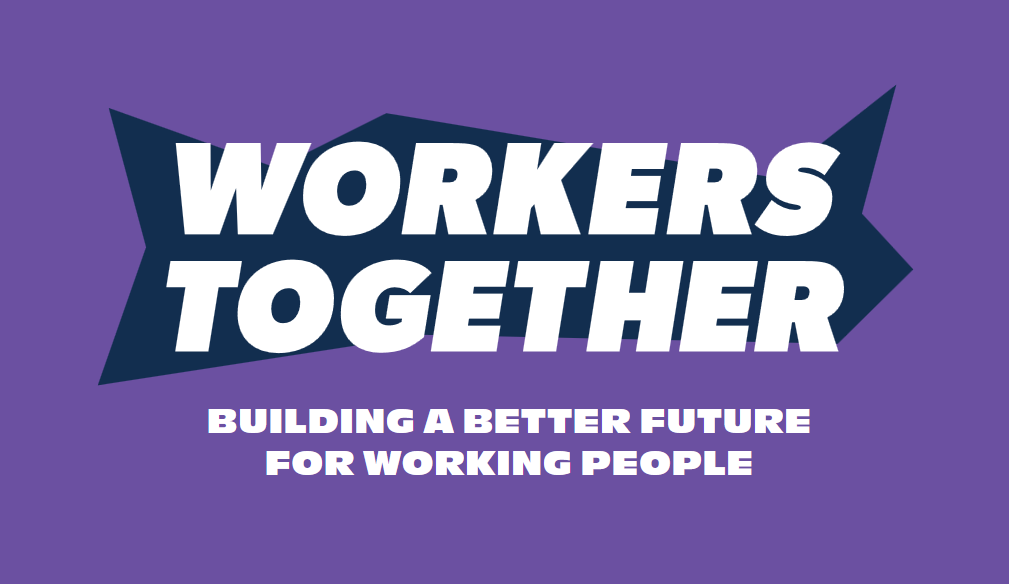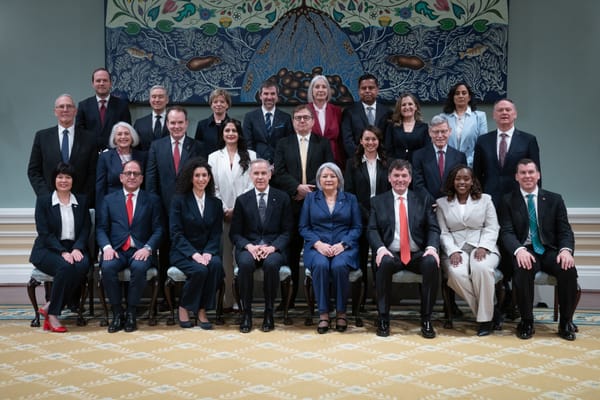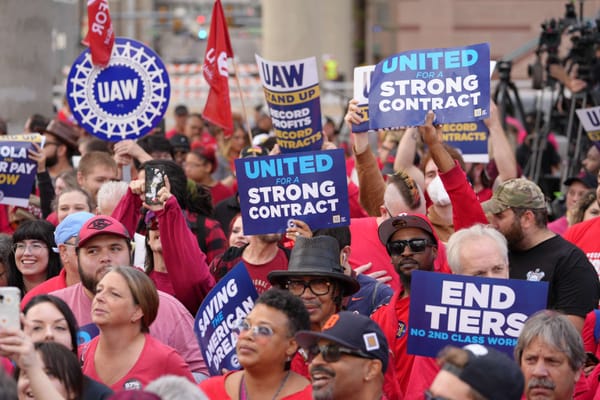
Union organizing among those in non-standard employment, especially freelance and contract-based workers, can be challenging. For this week’s newsletter, I sat down with Jonny Sopotiuk, President of the Arts and Cultural Workers Union, also known as IATSE Local B-778, to talk about unions and cooperatives in the arts and culture sector.
Sopotiuk lives in East Vancouver on the unceded territories of the Musqueam, Squamish and Tsleil-Waututh. He’s a union and community organizer and a visual artist. He’s been organizing since high school, and has been a labour organizer for about 15 years.
We talked about the recent organization of IATSE Local B-778 and the Vancouver Artists Labour Union Cooperative (VALU), two organizations building collective strength among artistic and cultural workers in British Columbia.
Adam King: Tell us about IATSE B-778.
Jonny Sopotiuk: IATSE B-778 is the Arts and Cultural Workers Union (ACWU). It’s a brand new union local of the International Alliance of Theatrical Stage Employees (IATSE).
To step back a bit, we formed as a chartered IATSE local with 17 members in January 2020, but our group of arts and cultural workers had been meeting for about eight months before that. We formed as an independent union first, mainly because we didn’t think any of the major unions would want to bring in a bunch of weird, eclectic visual artists who worked freelance and gig work.
I ran into the IATSE international organizer at a BC Federation of Labour convention and told him about ACWU and he was like, “That sounds really cool, we should chat. IATSE is organizing and we have this ‘growth mandate.’”
The IATSE leadership flew out to Vancouver and met with us about forming a chartered local. So, we’re a “B-local,” which is different from their film and theatre craft-based locals. We have more alignment with what they’d consider “front of house.” We’re freelance artists but also arts administrators who work in more typical employment settings with galleries, non-profit arts organizations and artist-run centres.
We’ve grown to 50 members in a couple of different units, including those working in our affiliated cooperatives VALU and Vancouver Sewing Labour Union (VLSU). We then have two units for our freelance visual and cultural artists, plus bargaining units at worksites we’ve certified, including the Contemporary Art Gallery, Gallery Gachet, CARFAC BC, Cineworks and Love Intersections.
AK: IATSE B-778 represents both freelancers and workers in traditional employment relationships. Can you tell me about how you organized freelancers and what the Vancouver Artists Labour Union (VALU) Cooperative is?
JS: The VALU CO-OP was really the instigator of all this. I was having a lot of one-on-one conversations with artists in Vancouver, people who were freelance artists and others who had abandoned their artistic practice because they couldn’t afford to maintain a studio. The number one issue for these people was the lack of living-wage work opportunities. So, we wanted to organize around issues in workplaces, but what was more pressing was access to good jobs in the first place.
Second, we heard about artists getting freelance jobs for non-profits or coffee shops but then dealing with exploitation, low wages, bullying and harassment. And then a big issue, especially for emerging artists, is access to time off. Because artists might be forced to turn away grants or residencies when these don’t work with their other freelance employers’ schedules.
So we wanted to create a space where artists could come together and address these issues and get access to flexible work opportunities. VALU is the result of this. It’s an artist-run worker co-op. We have a commercial print and screen-printing shop, button-making and sticker-making. We opened a video division. VALU works with other, usually progressive organizations, like unions and community groups, and negotiates contracts for products and services. All of this money goes into the co-op and provides jobs for our members.
VALU also has an explicit value set. Driven by the members, it has an outward looking focus on the broader arts sector. We take our organizing language and structure from the worker centres that exist in many cities. We look at it as a worker centre in the arts community. And that’s really how people got interested in organizing IATSE B-778. People came to unionization through the work we were doing at VALU. They saw labour politics and a new type of workplace in practice and they wanted support in their other workplaces.
Our long term goal with the freelancers division is to build a portable benefits plan, so they can take contracts or grants but still have access to high quality benefits. We’ve also launched a mutual aid fund through the membership, so if a member gets injured or has another issue they can access financial or other mutual support through the union.
AK: Cooperatives have long been a part of the left’s broad economic orbit, but there are also many socialists who are critical of their limitations. For example, worker-owners might end up ‘self-exploiting’ because of pressures to compete under capitalism. How does VALU and its relationship to B-778 address this?
JS: That’s an important critique. I think some people on the left look at worker co-ops as a utopian space without critiquing their location within capitalism. I would say that worker co-ops are part of the strategy, they’re not the end goal. A worker co-op strategy even on its own is not revolutionary or system-changing. Yes, co-ops have to exist within the current economy of competition and market exchange and I’d say that many co-ops are not politicized or thinking about their worker-owners as working people first. Some even hire non-members and profit from their work.
When forming VALU we had a lot of conversations about our politics, values and structure. First, we made it so there would be no investment shares. I think political worker co-ops need to do this. You don’t want outside investors making decisions without workers or profiting from their creative labour. We also prevented the co-op from providing dividend payments, which we got a lot of pushback from co-op developers about. But we wanted to ensure that VALU was first and foremost an organizing space. Our argument was that if the co-op is making a surplus, then we’re not paying members enough. We have a flat wage structure for all members, with some members not claiming a wage if they have outside, full-time employment.
At the end of the day, VALU has to operate as a ‘business,’ but we try to spread the ‘labour’ of being an owner throughout the membership. For example, when the pandemic hit, the co-op had a huge amount of business that completely dried up. The co-op had to shrink. We got rid of one of our studio spaces. We pushed back new investments for our screen printing shop. We also reduced the paid hours available. Workers together made these decisions and prioritized together what was getting scaled back.
The key point is that we’re trying to create democracy that doesn’t exist in other workplaces, even in unionized ones. But it’s not without its own set of problems and challenges.
AK: Is this where IATSE B-778 comes in?
JS: Yes, I think a worker co-op operating on its own isn’t changing anything. We need to be working together with the labour movement to challenge capitalism and exploitation. So, IATSE B-778 is there to deal with bigger issues in the arts sector, and along with the VALU co-op is there as a resource. Two members on the executive of the union local are from VALU and the rest are from other arts organizations. The union has been drawn on to resolve conflicts among co-op members and is there to provide resources for members.
Another issue is that arts organization funding can shift and employment can fluctuate. For a union, building an organized structure is difficult if many people don’t have stable employment and are often living in poverty. So affiliation with the larger structure of IATSE provides access to a pooled benefit plan that’s essentially subsidized by film workers because of how profitable that industry is. But the co-op is there as an anchor institution because of the dues that they generate from the unionized members. Those are then used to subsidize our organizing of smaller arts centres.
Then there are things like legal fees. For example, we had a fight with a small arts organization that was arguing that its short-term contract workers didn’t have rights to union membership. We had to go to the labour board. We wouldn’t have been able to afford these types of battles without the co-op as a sustainable dues base for the membership.
AK: Can you tell us about your union local’s relationship with the labour movement in Vancouver, British Columbia or even Canada?
JS: Through IATSE, we’re affiliated to the Canadian Labour Congress and the BC Federation of Labour, and the members have also made the decision to affiliate to the Vancouver and District Labour Council. Members have decided to be directly involved and active as delegates in all these meetings. I think that’s an active articulation of our politics. Our members want to be involved in the labour movement.
In the day-to-day operations of our local, we’ve been focused on bargaining our first sets of contracts. We have four units currently bargaining their first contracts right now. So that’s taking up the majority of our organizing capacity.
But we’ve had many conversations about how to act in solidarity with other workers. We participated in a solidarity campaign for CUPW (Canadian Union of Postal Workers) postal workers. We have a working group involved in creating a larger worker action centre in Vancouver. Five of our members picked this project up after the BC Federation of Labour dropped it.
I think there is more we could be doing, but so far we’ve been fairly internally focused.
One other thing I’m excited about involves two of our VALU members who have a series called Hot Pot Talks. They do artist talks where they invite artists and cultural workers who are involved in Chinese community organizing from around Canada. They have conversations over hot pot about arts and labour, and we’ve seen new organizing in our union and others coming out of these talks.
There’s so much creative potential through our co-op and union members, and I think where labour sometimes falls short is on creative campaign approaches, particularly with young workers. There’s energy and capacity within our membership to help the larger labour movement.
AK: There have been historical moments when artists and the left have formed strong ties, but the labour movement hasn’t been all that successful in organizing artists or other workers in nonstandard forms of employment. Does B-778 offer an example for others to follow?
JS: I think about this a lot. I think labour has become complacent, especially among ‘business unions.’ Second, I think we’re sometimes too reactionary, waiting for issues to come up that we then rightfully take on. But proactive outreach and organizing doesn’t happen enough. Third — regarding non-traditional forms of employment — I think the labour movement has just accepted the legal framework dictating who is a worker or an employee. We need to challenge this. Many employers now use independent contractor status to exploit workers.
On the other hand, in the arts and creative industries, I think we’re missing the fact that many workers voluntarily choose this type of flexibility. In B-778 we’re focused on the fact that this is the long-term reality for most people in the arts sector, and many of them want the freedom and autonomy that comes with being freelance. I think that what we need to do through labour organizing is to build alternatives through unions and cooperatives.
For example, we’ve got two new groups of freelancers in conversation with the union. One is a group of tattoo artists and the other is a group of photographers. Rather than the alternative of being an employee of some other shop or organization or being a business owner, they’re interested in forming collectives where they can have some independence but they’re working together. This is where the worker co-op organizing strategy comes in. We can help build places where people can collectively work together and support each other through a broader structure.
I think this is a model of organizing work that could operate in a lot of other sectors, not just the arts. We should also be looking at ways for the labour movement to support conversions where existing businesses that are closing can be turned into co-ops rather than be bought up by other investors.
What we’re trying to do in IATSE B-778 is to take a broader view, to change how we look at work and union organizing in the arts and culture sector.
The growth of precarious employment has necessitated new approaches to labour organizing and unionization. Sopotiuk and IATSE’s work in this direction is both inspirational and instructive.
Let’s hope B-778’s model and its organizing work within the broader Canadian labour movement will galvanize other workers to look for collective solutions to precarious employment and a lack of power at work.






